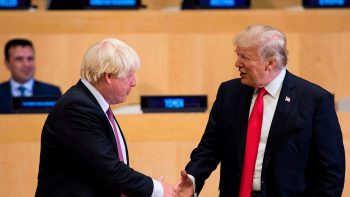Will the Libyan economy get help from Gaddafi’s money?
Jeremy Hobson: Still no sign of Muammar Gaddafi, but Libya’s National Transitional Council isn’t waiting. Representatives of the rebel government are asking the U.S. and other countries to release billions of dollars of Gaddafi’s money — assets that have been frozen for months.
When the fighting began in Libya, Marketplace’s Stephen Beard accompanied a London real estate expert name William Green to some London mansions owned by Gaddafi’s family.
Well, Stephen is back on the beat today, looking into if and when Gaddafi’s assets will be released. He joins us now from London. Hi, Stephen.
Stephen Beard: Hello, Jeremy.
Hobson: Well the fighting is still going on in Libya. Is it a bit too early to be debating this?
Beard: Well, not really. I mean, the rebels need cash. The rebel council — the NTC — has been living on handouts from sympathetic countries like Qatar and Kuwait. But it needs a lot more cash now, and not only for the obvious things like food and medical supplies. Once the fighting stops — and lets hope it stops fairly soon — it’s going to need to establish its authority in Tripoli and throughout the whole country. And it’s going to need money for that — to pay the police, to pay the civil servants. And the frozen assets could be the most immediate source of that cash.
Hobson: Okay, let’s say they decide to release the funds. First of all, who do they send the check to?
Beard: Well that, of course, is the big problem. There’s still a lot of doubt about the rebel council, the NTC. Can it be totally trusted? Will some of this cash end up lining some personal pockets, wind up in some personal bank accounts? An even bigger worry, though, says Shashank Joshi of London think tank the Royal United Services Institute — a bigger worry is that the council may have indirect links with Islamist groups that are very hostile to the U.S. and Europe.
Shashank Joshi: No one wants to see state funds released only for them to wind their way to Al-Qaeda. Not to say that’s prevalent but it’s a risk no one is willing to take.
And, he says, that means the U.S. and Europe will be very cautious and careful in un-freezing these Libyan assets. And initially, they will probably only release tens of millions, rather than billions of dollars.
Hobson: Marketplace’s Stephen Beard in London. Stephen, you’ll be taking a look later today on Marketplace at what Muammar Gaddafi still owns around London. We’ll tune in for that. Thanks for joining us this morning.
Beard: Thanks very much, Jeremy.
There’s a lot happening in the world. Through it all, Marketplace is here for you.
You rely on Marketplace to break down the world’s events and tell you how it affects you in a fact-based, approachable way. We rely on your financial support to keep making that possible.
Your donation today powers the independent journalism that you rely on. For just $5/month, you can help sustain Marketplace so we can keep reporting on the things that matter to you.


















